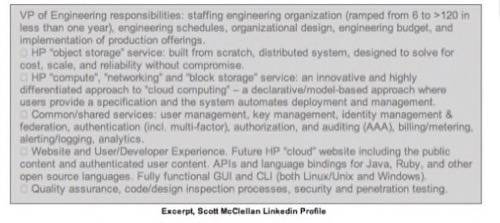A vice president of engineering at Hewlett-Packard social media snafu, may have released the company’s roadmap for building its upcoming cloud service.

Scott McClellan, interim VP of engineering for HP’s cloud service, posted the plans on his LinkedIn profile, according to The Register which was able to capture the information before it was taken down. The plans include an “object storage” service built from scratch, “compute,” “networking” and “block storage” service which is described as “an innovative and highly differentiated approach to cloud computing.” McClellan also reportedly listed working on the user interface for HP’s cloud website with “APIs and language binds for Java, Ruby, and other open source languages. Fully functional GUI and CLI (both Linux/Unix and Windows).”
To this point, HP has been relatively tight lipped to the specifics of what its proposed cloud operation would offer. The primary thought has been that HP would be joining rival Dell in creating a Microsoft Azure-based platform. Yet, according to The Register, there was no mention of anything correlated to Azure in McClellan’s profile. It would likely that HP would integrate .NET and C# functionality into its cloud plans given the close working relationship between Microsoft and HP over the years, even given the recent theoretical rift created when HP bought Palm and WebOS. “Java, Ruby, and other open source languages” could mean that HP will drive for ubiquity in its cloud platforms while also hedging its bets.

Image via The Register
Amazon is the leader in cloud services with its EC2 and Simple Store Service offerings. The Register intimates that the block storage, object store and networking that will be built from the ground up are aimed at taking some of Amazon’s business.
The Register reports that a “person familiar with the matter” said that HP plans on unveiling the details of its cloud strategy at VMware’s VMworld conference in August. It would make sense for HP to partner with VMware for virtualization to the cloud and the mention of “various open source languages” would give credence to that rumor.

















